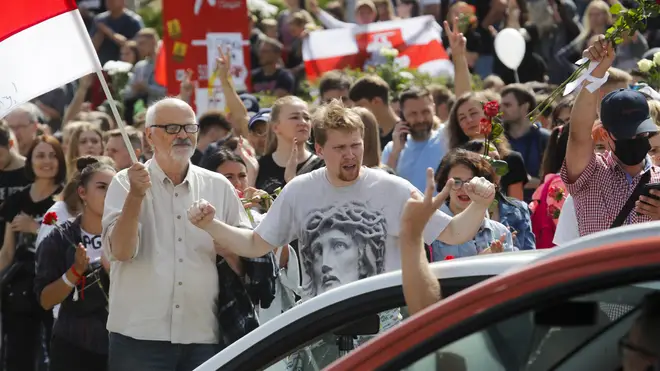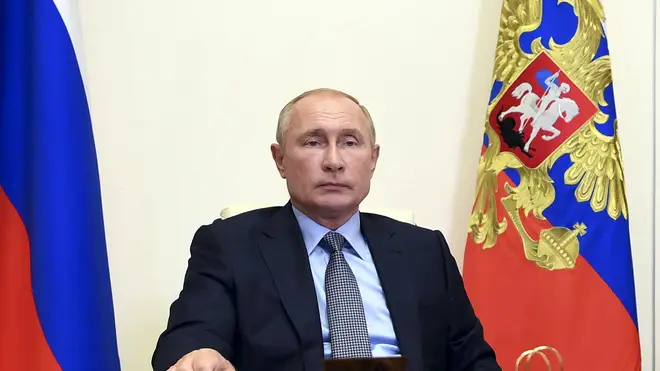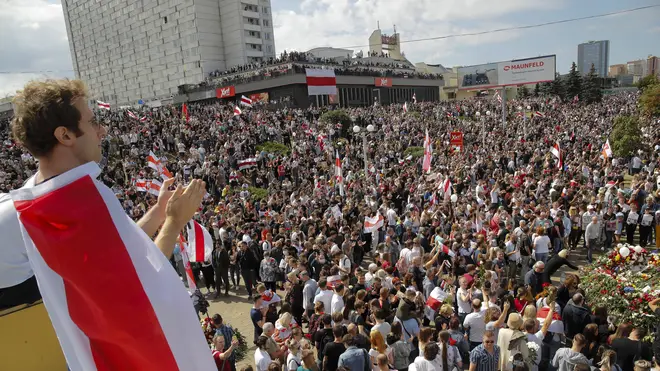
Paul Brand 10am - 12pm
15 August 2020, 21:07

Vladimir Putin will provide Belarus with security assistance after counter-protests have engulfed the country following recent presidential election results.
President Alexander Lukashenko spoke several hours after a phone call with the Russian President and after protesters again demanded that he resign after 26 years in power.
Thousands of demonstrators rallied Saturday at the spot in the capital of Minsk where a protester died this week in clashes with police. Some stripped off their shirts to display deep bruises they said came from being beaten by police.
It was the seventh consecutive day of large protests against the results of the August 9 presidential election in which election officials said Mr Lukashenko won a sixth term in office in a landslide. Opposition supporters believe the figures have been manipulated.
Mr Luksahenko did not specify what sort of assistance Russia would be willing to provide. But he said "When it comes to the military component, we have an agreement with the Russian Federation" in the framework of the countries' union agreement".
"These are the moments that fit this agreement," he added.
Despite harsh police crackdowns against the protesters, including the detention of some 7,000 people, the demonstrations have swelled into the largest and most sustained anti-government movement since Mr Lukashenko took power in 1994.

Earlier, 65-year-old Mr Lukashenko on Saturday rejected suggestions that foreign mediators become involved in trying to resolve the country's political crisis.
He discussed the situation in a call Saturday with Mr Putin, the first publicly known direct contact between the two leaders since the election. A Kremlin statement said Mr Putin and Mr Lukashenko both expressed hope for a quick resolution to the tensions.
"It is important that these problems are not used by destructive forces aimed at causing injury to the co-operation of the two countries in the framework of the union state," the Kremlin said.
Russia and Belarus reached an agreement in 1997 about closer ties between the neighbouring ex-Soviet countries in a union that stopped short of a full merger, although that has collided with recent disputes between the countries and Mr Lukashenko's suspicions that Mr Putin's government wants to absorb Belarus.
Later, in a meeting with defence ministry officials, Mr Lukashenko declared "Listen - we have a normal country, founded on a constitution. We don't need any foreign government, any sort of mediators."
He appeared to be referring to an offer from the leaders of Poland, Lithuania, Latvia and Estonia to become involved.
Mr Lukashenko's main election opponent, Sviatlana Tsikhanouskaya, fled to Lithuania the day after the election, knowing that several previous presidential challengers have been jailed for years on charges that supporters say were trumped up.

A funeral was held Saturday for Alexander Taraikovsky, a 34-year-old protester who died Monday in the capital Minsk under disputed circumstances.
Belarusian police said he died when an explosive device he intended to throw at police blew up in his hand.
But his partner, Elena German, told The Associated Press that when she saw his body in a morgue on Friday, his hands showed no damage and he had a perforation in his chest that she believes is a bullet wound.
About 5,000 demonstrators gathered Saturday in the area where Mr Taraikovsky died. They laid a mass of flowers in tribute as passing cars blared their horns.
"It's awful to live in a country where you can be killed at a peaceful protest. I will leave, if power isn't changed," said 30-year-old demonstrator Artem Kushner.
The brutal suppression of protests in Belarus has drawn harsh criticism in the West. European Union foreign ministers said Friday that they rejected the election results in Belarus and began drawing up a list of officials in Belarus who could face sanctions over their role in the crackdown.